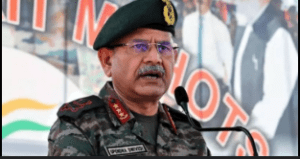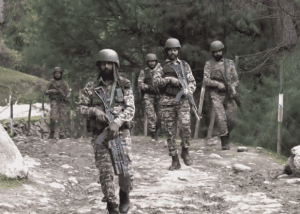Srinagar/New Delhi, April 25, 2025 — In the wake of the recent Kashmir attack that claimed the lives of security personnel and civilians in Pahalgam, India has entered a heightened state of security alert. The Indian Army Chief, General Manoj Pande, is set to visit Srinagar to assess the evolving security situation firsthand. This strategic visit follows a series of high-level defense and intelligence meetings in Delhi aimed at formulating a calibrated response to cross-border terrorism.
The Kashmir attack has not only intensified tensions between India and Pakistan but also drawn global concern, with the United Nations urging both nations to exercise “maximum restraint” amid rising hostilities. The Indian Army has already launched intensified counter-insurgency operations in the Valley, particularly in the Bandipora and Anantnag districts, while civilian movement remains heavily monitored.
Also Read: Encounter Erupts in Bandipora, Jammu & Kashmir Amid Intensified Security Operations
Army Chief’s Visit Aimed at Strategic Review and Ground-Level Assessment


Sources from the Ministry of Defence confirm that the Army Chief is likely to interact with soldiers stationed along sensitive sectors near the Line of Control (LoC), particularly in Baramulla, Kupwara, and Bandipora, where recent intelligence inputs have flagged increased infiltration attempts.
UN Urges Dialogue and Restraint
In a formal statement issued from New York, the United Nations expressed deep concern over the surge in violence in Kashmir and emphasized the need for “maximum restraint” from both India and Pakistan. UN Secretary-General António Guterres reiterated his appeal for dialogue, noting that “any escalation could have far-reaching consequences in an already volatile region.”
The statement comes amid India’s recent diplomatic outreach to brief global powers about Pakistan’s alleged support for cross-border terrorism. Meanwhile, Islamabad has denied involvement in the Pahalgam attack and accused New Delhi of politicizing the situation.
High Alert Status Across Kashmir Valley
 Security forces across Jammu and Kashmir remain on high alert, especially in Srinagar and South Kashmir districts, following a series of encounters, including the recent gunbattle in Bandipora. Security grids have been reinforced with aerial surveillance, drone reconnaissance, and troop mobilization near potential infiltration points.
Security forces across Jammu and Kashmir remain on high alert, especially in Srinagar and South Kashmir districts, following a series of encounters, including the recent gunbattle in Bandipora. Security grids have been reinforced with aerial surveillance, drone reconnaissance, and troop mobilization near potential infiltration points.
In addition, intelligence agencies are working in tandem with the National Investigation Agency (NIA) to trace the funding and network behind the Pahalgam attack, which reportedly involved foreign-made weapons and communication intercepts linked to handlers based across the border.
Political Responses and Civilian Concerns
Union Home Minister Amit Shah chaired a high-level security review in Delhi, reiterating the government’s zero-tolerance policy towards terrorism. He assured the families of martyrs full support and announced enhanced compensation and welfare measures for security personnel serving in conflict zones.
Meanwhile, residents of Kashmir are grappling with curfews, internet restrictions, and movement limitations. Civil society members and political leaders in the Valley have urged the Centre to ensure civilian rights are respected while pursuing counter-terror operations.
Strategic Implications and Next Steps
The Army Chief’s visit marks a pivotal moment in the government’s calibrated military and diplomatic response. Analysts suggest that India is working to avoid escalation while preparing for a long-term strategy to curb terrorism and ensure regional stability. Pakistan’s recent missile test near the Karachi coast has further strained bilateral ties and prompted heightened surveillance across India’s western front.
The UN’s involvement underscores the international community’s focus on Kashmir and its geopolitical sensitivity. However, India maintains that the situation remains an internal matter and that necessary steps will be taken to secure the nation’s sovereignty and citizens’ safety.
Conclusion
The Kashmir attack has reignited global attention on one of the world’s most volatile regions. With the Indian Army ramping up security measures and Pakistan continuing missile test preparations off the Karachi coast, the region remains on a knife’s edge. The Army Chief’s visit to Srinagar is being viewed as a critical moment in determining India’s immediate and long-term counterterrorism strategy.
As calls for de-escalation grow louder, including from the United Nations and major world powers, the coming days will prove crucial in shaping the geopolitical dynamics in South Asia. While India asserts its right to defend its sovereignty, international stakeholders are watching closely, urging a path of dialogue over confrontation.
🔗 Official Statement by UN Secretary-General António Guterres – un.org

